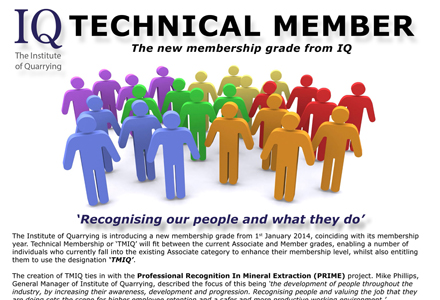
The IQ (
The international professional body for quarrying, mining and the related extractive and processing industries, has over 5,000 members in some 50 countries, with membership open to individuals rather than companies.
IQ’s long-term objective is to promote progressive improvements in all aspects of operational performance through the medium of education and training.
Originating from a meeting of The Association of Quarry Managers in Caernarfon, North Wales, UK, in October, 1917, the IQ grew, and now embraces affiliate organisations in Australia, New Zealand, Malaysia, Southern Africa and Hong Kong.
In September 2012, it moved to new premises, McPherson House, (named after its founder), near the city of Nottingham, central England, which acts as an industry meeting hub and also houses MPQC (Mineral Products Qualification Council).
“The IQ has always put education at the top of its agenda,” says the IQ.
For many years the standard Quarry Manager’s Qualification, giving an individual corporate membership of the institute, was the DAPS course (Doncaster Assisted Private Study). In 2007 it moved to the
It also offered the potential to develop a strong partnership with an educational body; initiated the possibility of developing additional qualifications for industry, and opened up the resources of the university to the IQ.
Course content within the Diploma has shared ownership, with all the extractives related materials owned and updated by the IQ and engineering/mathematics content managed by the university.
In 2008 IQ converted all the content from word-based to web-based format, an e-learning environment that was able to support rich media and interactivity.
It recognised that course content in electronic format could also be used to develop new qualifications; to look at the international market and to develop bespoke CPD (Continuing Professional Development) modules.
In 2009, the IQ, in partnership with the university, developed the University of Derby Certificate in International Quarry Operations, consisting of four modules, focusing on best practice, management, processing and blasting.
“Key units were taken out of the Diploma and de-anglised, with reference to UK specific regulation and legislation omitted. The course ran with an original cohort of 11, building in 2012 to 24,” says the IQ. “The course was aimed at up-skilling supervisors; providing key operational content to managers with mining or related degrees and consultants and those people working within the supply or manufacturing environment.”
In 2012, course provision moved to the headquarters of the University of Derby Corporate (UDC) in the city centre.
“The partnership has strengthened since the move to UDC with a forward plan to create new qualifications across the complete spectrum of the industry, covering not just quarrying, concrete and asphalt but such subjects as clay, cement, mining and bricks. The various provisions will be managed within the MPPD (Centre for Mineral Products Professional Development) which opened in July 2013.
“In mid-2012 all the courses had a timeframe submitted for revalidation. The current module size had to change from 15 to 20 credits with a consequential increase in content, where required. This also changed the overall qualification size.
“The change in credit value opened up the possibility of offering a complete suite of qualifications. It enabled a connected approach; a progression route for candidates; the input of fresh materials, and an appeal to a wider audience, UK/EU and international versions,” says IQ.
The new suite of qualifications now on offer includes an Honours Degree in Mineral Extractives Management; a Foundation Degree in Mineral Extraction Technology, and a Diploma in Mineral Extraction.
The Honours Degree is aimed at managers aspiring to senior roles within a business with a key focus on adding value to an organisation.
The Foundation Degree provides the key skills and competencies required to manage an overall extractives operation (s) and takes three years to complete subject to previous qualifications and experience.
The Diploma AIMS to up-skill managers and supervisors by adding key operational management techniques and best practice.
In addition a number of short courses on ready mixed concrete; construction materials and blasting and business management are also available.
“The IQ is actively promoting all courses on a global basis. The key feature enables all learners to study while at work, which makes a very cost effective method of learning.
“The IQ has taken the next step in developing a range of qualifications covering the extractives industry. The need to provide operational management qualifications has never been greater especially where safety, health and environmental factors, best practice, efficiencies and sustainability are key industry drivers.
“The new suite of qualifications will add true value to a business and give an edge in a competitive world.”








